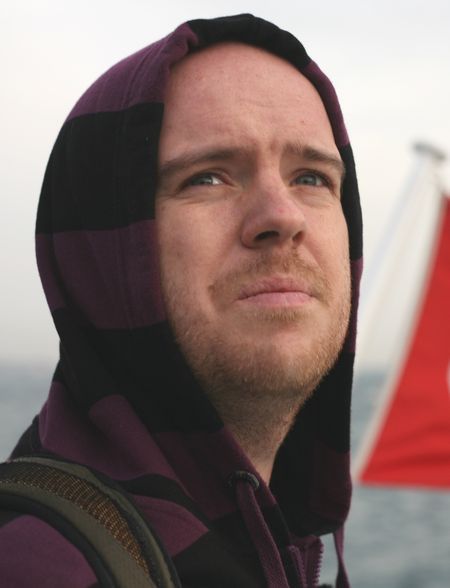First Secretary of the Central Committee of the Polish United Workers’ Party as the last emperor of Ethiopia
The journalist of Gazeta Wyborcza Witold Szablowski told The Day about the peculiarities of the Polish school of journalism, his work in Turkey, and experiments on resuming the Polish People’s Republic
Witold Szablowski is one of the representatives of the young generation of Polish journalists who carries on the tradition of the Polish school of journalism. Now Witold is working for Gazeta Wyborcza and often goes to Turkey on business. Szablowski is the first Polish journalist who conversed with the family, the fiancee and the environment of Mehmet Ali Agca who had attempted John Paul II.
Last year Witold Szablowski’s book of reports about Turkey called Killer from the Apricot City was published in Ukrainian and at once gained a wide popularity. This year at the Lviv Publishers’ Forum the journalist presented his new book, a time journey Nash Maly PRL (Our Small PPR) written in cooperation with his wife Izabela Meyza. The couple of journalists tried to reconstruct in their everyday life the particularities of living in communist Poland without the Internet, mobile phones, computers, and other blessings of civilization that did not exists at that time; they were wearing their parents’ clothes, driving an old car and eating hardly anything but potatoes for a half of a year. Szablowski told The Day about the core of the report and the peculiarities of the Polish school, why he is attracted by Turkey and what is bad about capitalism in his opinion.
Why is the Polish school of journalism especially popular in the world?
“The uniqueness of the Polish school of journalism arises from the communist time when it shaped. Many things, especially political ones could not be said directly. The journalists were mastering the art of expressing their opinion about the world using allusions, understatements and metaphors. For instance, Richard Kapuscinski skillfully did it in his book Cesarz that was supposed to be about Haile Selassie I [the last emperor of Ethiopia. – Author], but in fact it depicted the first secretary of the Central Committee of the Polish United Workers’ Party Edward Gierek. Today the Polish school of journalism also willingly uses metaphors although the political regime has changed. Almost always our articles have their second and sometimes even third or fourth bottom. As for my teachers, they were Hanna Krall, Mariusz Szczygiel, and Jacek Hugo-Bader.”
You have been working as a reporter for quite a long time. What are the main components of a journalistic story?
“A real journalistic story is a text in which one can feel that they drank a cup or a glass, smoked a cigarette or travelled a long way with the hero of the report. This is the material in which the reporter did not take a short cut but suffered a bit. His goal was to study the person he was writing about. As for my stories, I really like the one called ‘Lady Peron’ about a homeless woman from the London Victoria railway station with whom I spent several days in the street living her life. As for my colleagues’ texts, I adore Hugo-Bader’s stories in which he is getting through Siberia or other exotic places [Jacek Hugo-Bader wrote a book of reports named White Fever about his journey in the Russian province. – Author]. Why do I write? I just can’t help writing.”
You do not live in Poland all the time, you often go to Turkey. Were you there during the recent developments?
“Yes, I was in Gezi Park, spent a couple of nights with the protesters and got poisoned by tear gas. Now Turkey is having hard times, mainly because of the situation in Syria that is destabilizing the region and it is unclear when it finishes. Meanwhile, the Prime Minister Erdogan is probably feeling as a sultan – he does not hear anymore what the people want. The Turks’ problem is that they hardly have anybody except Erdogan to vote for.”
In Turkey you had a conversation with the person who attempted the Pope John Paul II who had the Polish origin. Did you have any prejudiced feeling against the heroes of your reports from the book Killer from the Apricot City?
“Of course, it was very difficult talking to Mehmet Ali Agca’s family. For me he was a killer and for his family he was a fiance and a brother. I took great pains to explain why, in my opinion, he was far from being a saint. Probably, at the end of the day they still did not understand me. However, Turkey attracts me as it is a country of contrasts. One gets up in the morning and then might get into an unpredictable situation. I like such places. And Turkish hospitality.”
Your new book Our Small PPR was recently published in Ukrainian. In this book you do not travel in space but in time, so to say. Why did you need this experiment and what are its results?
“I remember the communism very badly but I rather wanted to travel back to the country of my childhood. First of all I was trying to show to the readers that we did not only win having adopted capitalism, but lost something as well. Especially in terms of interpersonal relations. I think that several decades ago people were much closer to each other.”
So, what is the main idea of your book, what would you like the Ukrainians to learn from it?
“The main idea is that sometimes one should turn off his or her iPhone or laptop and just spend some time with another person. There is nothing more important in the world and we often let the technologies interfere into our relations even with the closest people.”






